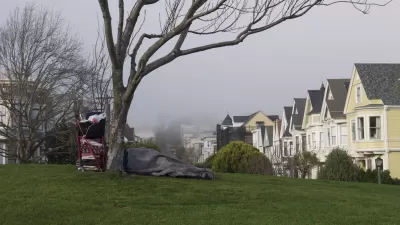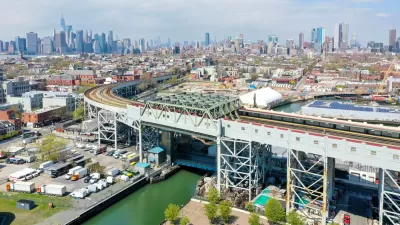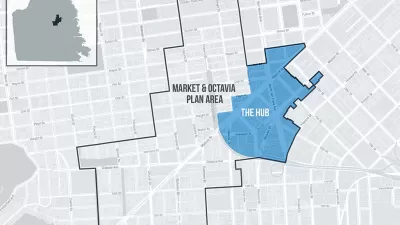In San Francisco, the relatively affluent are vocal in their denunciation of the "gentrifying" effects of the more affluent. This debate clouds the city's fundamental problems in housing its poor and working class residents, says Ilan Greenberg.

In San Francisco, "the debate [over gentrification] is dominated by fierce new champions of the anti-gentrification cause who aren't concerned so much about the truly poor being forced from—or tempted out of—their neighborhoods," writes Greenberg. "In their view, the victims of gentrification are also affluent, just less so than the people moving in."
“Middle-class people being bought out by upper-income people—that may be a political issue, but it’s not what we would call gentrification,” says Robert J. Sampson, an urban sociologist at Harvard University. “The affluent moving in—that’s an urban battle, but not gentrification.”
But for Dawn Phillips, co-director of programs for Causa Justa, a neighborhood organization responding to resident displacement in Oakland, and other advocates for the disadvantaged, these debates among the relatively affluent obscure the city's more significant problems.
"In Phillips’s world, the urgent issue isn’t whether the Bay Area’s new wealth has the same perspective and experience as the old. Nor is Phillips losing sleep over where in the city middle-class people are supposed to live," notes Greenberg. "Rather, for Phillips, the gentrification problem concerns government policies that for decades disinvested in neighborhoods, only to turn around and encourage real-estate investment when richer neighbors moved close. This, Phillips argues, systematically pushed vulnerable, disadvantaged people to the geographic margins, where there is little work, community resources, or personal networks."
FULL STORY: I Left My Home in San Francisco: The rise of the white, middle-class anti-gentrifiers

Planetizen Federal Action Tracker
A weekly monitor of how Trump’s orders and actions are impacting planners and planning in America.

Map: Where Senate Republicans Want to Sell Your Public Lands
For public land advocates, the Senate Republicans’ proposal to sell millions of acres of public land in the West is “the biggest fight of their careers.”

Restaurant Patios Were a Pandemic Win — Why Were They so Hard to Keep?
Social distancing requirements and changes in travel patterns prompted cities to pilot new uses for street and sidewalk space. Then it got complicated.

Platform Pilsner: Vancouver Transit Agency Releases... a Beer?
TransLink will receive a portion of every sale of the four-pack.

Toronto Weighs Cheaper Transit, Parking Hikes for Major Events
Special event rates would take effect during large festivals, sports games and concerts to ‘discourage driving, manage congestion and free up space for transit.”

Berlin to Consider Car-Free Zone Larger Than Manhattan
The area bound by the 22-mile Ringbahn would still allow 12 uses of a private automobile per year per person, and several other exemptions.
Urban Design for Planners 1: Software Tools
This six-course series explores essential urban design concepts using open source software and equips planners with the tools they need to participate fully in the urban design process.
Planning for Universal Design
Learn the tools for implementing Universal Design in planning regulations.
Heyer Gruel & Associates PA
JM Goldson LLC
Custer County Colorado
City of Camden Redevelopment Agency
City of Astoria
Transportation Research & Education Center (TREC) at Portland State University
Camden Redevelopment Agency
City of Claremont
Municipality of Princeton (NJ)





























